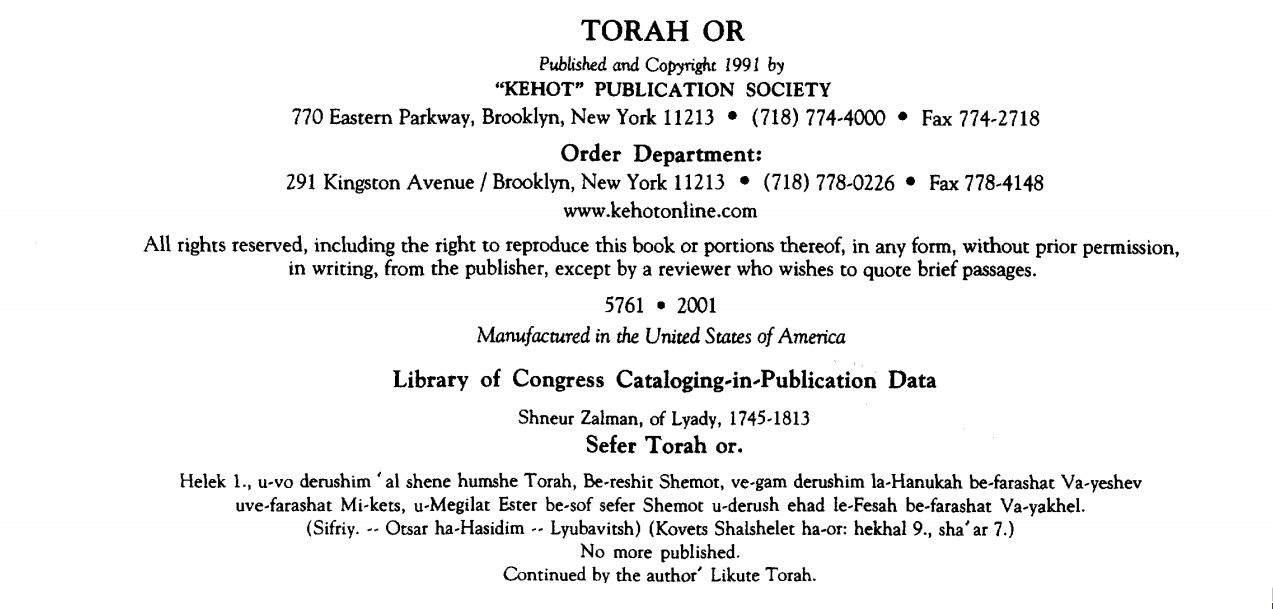There is this book (set), that was originally published a few hundred years ago (way before the copyright duration starts), but then recently published again, with some additions, in 1991, and in that 1991 version, the title cover says "all rights reserved. " and something like "forbidden to reproduce" etc.
I'm assuming the company that is publishing it must have some kind of rights to it, but still, do they really have full rights the the actual contents of the book?
To give some more context / details about this case, from the wikipedia article about these books:
The work was published originally in two parts. The first part, Torah Or, was first printed in 5597 (1837) in Kopust, with treatises, most of them from 5556 (1796) through the end of 5572 (1812), covering Genesis and Exodus, the first two books of the Pentateuch, with several discourses on Shavuot and Pesach. The second half was published in Zhitomir in 5608 (1848) under the title Likutei Torah, covering Leviticus, Numbers and Deuteronomy, the final three books of the Pentateuch, Song Of Songs, the festivals, Rosh Hashana and Yom Kippur.2
So it was published in two parts, but the latest the original versions were published were 1848. Now, the cover page of the modern printing says:
The key part of the statement is the following line:
All rights reserved, including the right to reproduce this book or portions thereof, in any form, without prior permission,
in writing, from the publisher, except by a reviewer who wishes to quote brief passages.
5761 • 2001
Manufactured in the United States of America
Library of Congress Cataloging-in-Publication Data
Shneur Zalman, of Lyady, 1745-1813
So there seems to be 2 contradictory things in that statement: #1, it says that it's copyright and published in 2001, but at the bottom, it mentions the original authors name, and says explicit when we lived, which based on that, seemingly would mean that it is in the public domain. Possibly when it was first published, it wasn't necessarily copyrighted, so maybe that changes things. From the official copyright law website, section 302:
- Duration of copyright: Works created on or after January 1, 19784 (a) In General.—Copyright in a work created on or after January 1, 1978, subsists from its creation and, except as provided by the following subsections, endures for a term consisting of the life of the author and 70 years after the author’s death.
(b) Joint Works.—In the case of a joint work prepared by two or more authors who did not work for hire, the copyright endures for a term consisting of the life of the last surviving author and 70 years after such last surviving author’s death.
(c) Anonymous Works, Pseudonymous Works, and Works Made for Hire.—In the case of an anonymous work, a pseudonymous work, or a work made for hire, the copyright endures for a term of 95 years from the year of its first publication, or a term of 120 years from the year of its creation, whichever expires first. If, before the end of such term, the identity of one or more of the authors of an anonymous or pseudonymous work is revealed in the records of a registration made for that work under subsections (a) or (d) of section 408, or in the records provided by this subsection, the copyright in the work endures for the term specified by subsection (a) or (b), based on the life of the author or authors whose identity has been revealed. Any person having an interest in the copyright in an anonymous or pseudonymous work may at any time record, in records to be maintained by the Copyright Office for that purpose, a statement identifying one or more authors of the work; the statement shall also identify the person filing it, the nature of that person’s interest, the source of the information recorded, and the particular work affected, and shall comply in form and content with requirements that the Register of Copyrights shall prescribe by regulation.
So, this is if the work was published after 1978, in this case, sometime in 2001 or 2002, it says that it's "70 years after the authors' life", but in this case, the orginazation that published the works is not the author, they just got it from somewhere else and published it, so I'm not sure if that would still be the case here, since, as mentioned before, the author was from 1813, and 1813 + 70 = 1883, long ago, so seemingly it should be ok. However, maybe this would then fit under subsec. "c", "Anonymous works etc...", which states, as quoted above:
In the case of an anonymous work, a pseudonymous work, or a work made for hire, the copyright endures for a term of 95 years from the year of its first publication, or a term of 120 years from the year of its creation, whichever expires first.
So in this case, the first publication (although not in the US) was in the year 1848, and 1848 + 95 = 1943, which has already passed. Or, it said, 120 years from "its creation", lets see: it doesn't say in the wikipedia page when it was created (as opposed to published), but even assuming it was created right before it was first printed, that would be 1848 + 120 = 1968, still a year that has already passed.
So, can someone explain to me how the modern day book publishing company can copyright this work that was first published way more than 120 years ago? Do they own the rights to it at all? Can anyone republished (the original text of) it? If not, this seems to be similar to copyrighting a bible or Torah text itself, which I'm pretty sure you're not allowed to do, meaning copyrighting it has no effect, since its so old.
So what's the law here?
